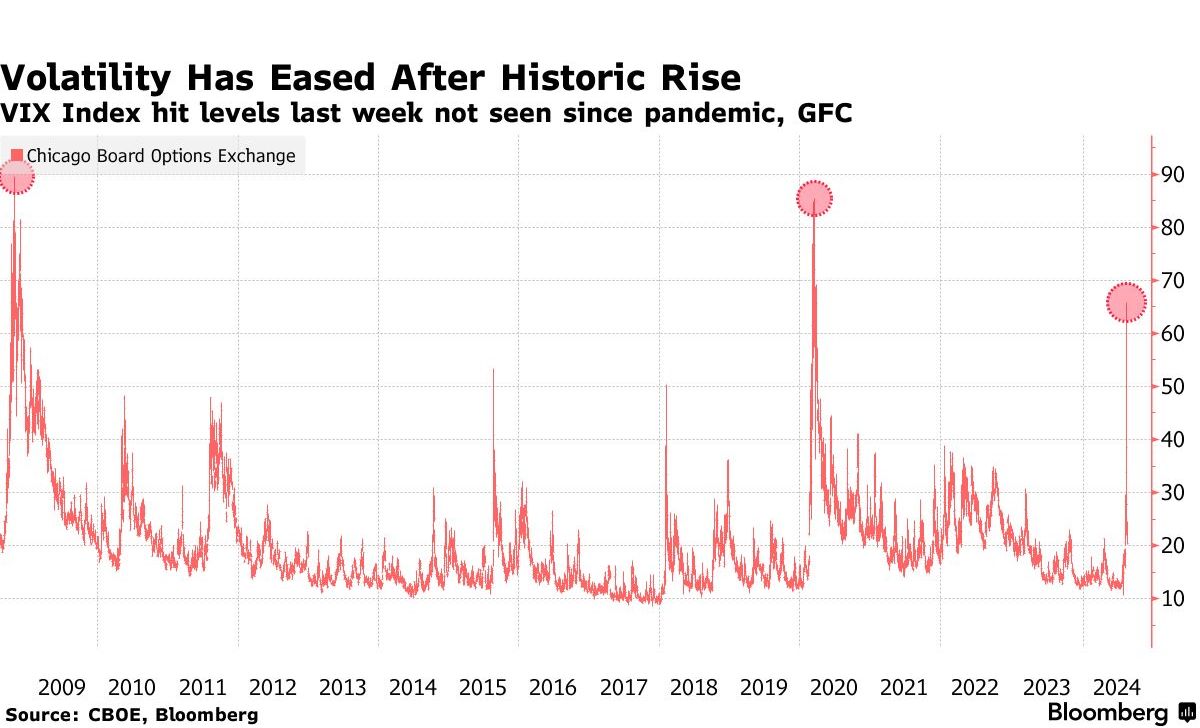Asian stocks rose for the second consecutive session as markets shifted their focus to key US data this week for insights into the health of the world’s largest economy.
Regional stock indices climbed on Monday, building on a 1.5% gain from Friday, with benchmarks in Australia, Taiwan, and South Korea edging higher. Hong Kong shares fluctuated, while mainland stocks remained largely unchanged. Japanese markets were closed for a holiday.
A sense of calm returned after markets were shaken early last week by concerns that the Federal Reserve might delay interest rate cuts. The Cboe Volatility Index, a measure of Wall Street’s fear, has retreated from its highest level since the early days of the Covid-19 pandemic. The yen was slightly weaker against the dollar on Monday.
“The skies are not fully clear yet, but several factors suggest that relatively calmer waters may lie ahead,” said analysts at Nomura Holdings Inc., noting a reduction in fears about a US recession and lower chances of an overly hawkish Bank of Japan as reasons for optimism.

The yen surged last week as traders reduced bearish bets following the BOJ’s rate hike, leading to a negative feedback loop as investors exited carry trades, though it ended the week little changed. The BOJ and Fed are the primary variables driving trading, according to Taosha Wang, a portfolio manager at Fil Asia Holdings Pte Ltd. Regarding the US, she told Bloomberg Television’s Yvonne Man and David Ingles on Monday, “I don’t think the market has agreed—either a recession, which we think is excessive, or a soft landing.”
Read more: Crypto scammers pull in $155 million on latest Trump coin rumors
Elsewhere in Asia, traders will be watching China’s retail sales and industrial production data this week to gauge whether the country’s economy is gaining traction. China continues to battle bond market speculators, with state banks selling debt to support yields. Sovereign yields rebounded last week after authorities intensified their fight against bond speculators. The economy needs more stimulus as recent leading indicators suggest a loss of recovery momentum around mid-year, according to Bloomberg Economics.
New Zealand’s central bank will also decide on policy this week, with signs that the economy may enter its third recession in less than two years. Australian and New Zealand government bonds were little changed on Monday. Treasury cash trading was closed in Asia due to the holiday in Tokyo.
Economic Downturn
A tumultuous week for global bond markets moved toward calm on Friday as concerns about a potential US economic downturn—prompting a Treasury rally and a brief market meltdown – faded.
The US consumer price index (CPI) on Wednesday is expected to rise by 0.2% from June for both the headline figure and the core gauge, which excludes food and energy. However, these modest movements may not be sufficient to prevent the Fed from a widely anticipated interest rate cut next month.
Over the weekend, Fed Governor Michelle Bowman indicated that she still sees upside risks for inflation and continued strength in the labor market, suggesting she might not support a rate cut when US central bankers meet in September. Money markets have fully priced in a rate cut in September and about 100 basis points of easing for the year, according to Bloomberg swaps data.
In commodities, oil prices edged higher on Monday after a 4.5% gain last week. Some of the largest US oil refiners are scaling back operations at their facilities this quarter, raising concerns about a potential global glut of crude. Gold prices were lower.
Cre: Bloomberg

I’m Jessi Lee, currently living in Singapore. I am currently working as a trader for AZCoin company, with 5 years of experience in the cryptocurrency market, I hope to bring you useful information and knowledge about virtual currency investment.
Email: [email protected]











